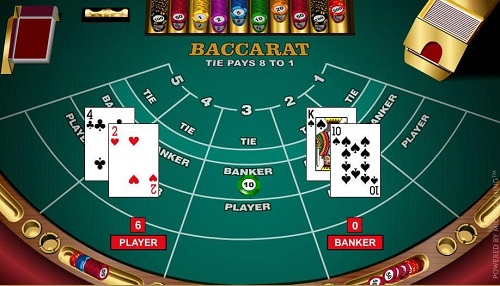The Banker’s hand wins more frequently than the Player’s hand, primarily due to the stricter drawing rules and the commission associated with Banker wins. Nonetheless, it’s crucial to understand that baccarat is a game of luck, and the result of each hand is unrelated to the one before it.
Before we dive into the statistical analysis, let’s establish a solid understanding of how baccarat works. Baccarat is typically played with eight decks of cards, and the game revolves around two primary hands – the Player’s and the Banker’s. There’s also an option to bet on a Tie, but we’ll focus on the Player and Banker’s hands for this discussion.

Banker’s Hand
As the name suggests, the Banker’s hand represents the house or casino. You can place bets on the Banker’s hand to win. Like the Player’s hand, the Banker’s hand aims for a total value as close to 9 as possible. However, the Banker’s hand has a slight advantage due to specific rules that govern its drawing of additional cards.
Player’s Hand
The Player’s hand in baccarat represents your hand as the bettor. You can wager on the Player’s hand to win. The goal is to have a hand value as close to 9. If the total value of the Player’s hand exceeds 9, only the last digit is considered. For example, if the hand consists of a 7 and an 8 (totaling 15), it counts as 5.
The Odds: Player vs. Banker
Let’s get to the heart of the matter – which hand wins more frequently in baccarat? Statistically, the Banker’s hand has a slight edge over the Player’s hand. The reasons for this advantage lie in the rules that dictate the Banker’s actions:
- Drawing Rules: The Banker’s hand has stricter rules than the Player’s. These rules are predetermined and require the Banker to draw a third card under specific conditions. The Player’s hand, on the other hand, follows a more straightforward set of rules.
- Commission: When you bet on the Banker’s hand and it wins, the casino usually charges a 5% commission on your winnings. This indicates the Banker’s advantage, as the commission is not applied to Player hand winnings.
- Tie Bets: While the Tie bet can be tempting due to its high payout, it has the lowest odds of winning. Therefore, focusing on the Player or Banker bets is generally recommended for better chances of winning.
Conclusion
In the world of baccarat, the debate between the Player’s hand and the Banker’s hand is as old as the game itself. While statistics may suggest that the Banker’s hand has a slight edge, it’s important to remember that baccarat is ultimately a game of chance.
Each hand dealt in baccarat is independent, and previous outcomes do not influence future ones. Therefore, even though the Banker’s hand may win more frequently, it only guarantees success in some rounds. The thrill of baccarat lies in its unpredictability, making every hand an exciting opportunity to test your luck.
As a US player, it’s crucial to approach baccarat with a sense of enjoyment and a responsible gambling mindset. Consider your risk tolerance, set limits, and savor the elegance of this timeless casino game. Whether you choose to bet on the Player or Banker, remember that baccarat is all about the thrill of the game.









